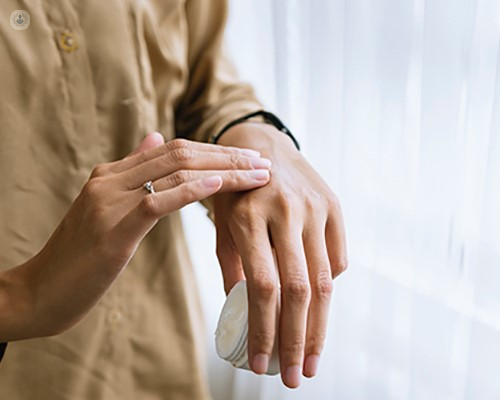Navigating eczema: Understanding triggers, symptoms, and practical solutions
Escrito por:In his latest online article, Dr Amr Salam gives us his insights into eczema. He talks about what can trigger eczema, symptoms, where on the body it can occur, lifestyle modifications or diet changes to help improve eczema, when you should see a doctor and when is treatment required.

What can trigger eczema in adults?
Atopic eczema, a complex condition, is primarily genetically determined, especially when there's a personal or family history of eczema, asthma, hay fever, or severe food allergies. These conditions collectively point to an underlying allergic predisposition in the body's immune system. Your genetic inclination towards eczema sets a threshold for its development, but there are additional factors that patients often identify as triggers or exacerbators. These include various infections (bacterial, viral, or fungal), exposure to allergens, contact with irritants like soaps and detergents, and frequently, stress. Hence, while genetic predisposition forms a baseline, environmental elements significantly contribute to the complexity of eczema.
What are the symptoms of eczema? Where on the body does it most commonly occur?
The most common symptom reported by patients is itching, although other symptoms can manifest, such as pain, stinging, burning, oozing, and a sensation similar to crawling. Furthermore, the cosmetic impact of eczema can be highly distressing, especially when it affects visible areas like the face or hands, significantly impacting individuals' self-confidence. While eczema can affect any part of the body, it commonly appears in skin creases like elbows, knee creases, wrists, and the neck. Additionally, the site of the body affected by eczema can change over time, which often puzzles patients as they wonder about the cause, but it's usually due to the condition evolving in its skin presentation.
Can lifestyle modifications or diet changes help to improve symptoms of eczema?
Maintaining a healthy and balanced lifestyle is crucial in managing any skin condition. This involves adhering to a balanced diet, sufficient sleep, regular exercise, and stress management. However, the active symptoms of eczema can hinder the pursuit of these healthy habits, affecting sleep and exercise. Seeking medical guidance is essential to break this cycle. While food allergies can contribute to or worsen eczema, it's more common in very young children than in adults. Avoiding specific foods is seldom the solution for controlling eczema. Many patients have attempted restrictive diets with minimal positive outcomes. It's important to note that dietary changes cannot replace medical treatment for this condition.
When should you see a doctor about eczema?
If eczema significantly affects your daily life, it's crucial to consult your doctor. This impact might disrupt various areas such as sleep, focus, work, hobbies, relationships, and mood. These valid reasons warrant seeking assistance. Dermatologists comprehend the extensive influence eczema exerts on individuals' overall well-being. It's essential not to endure this condition silently; instead, seek medical help to effectively manage it.
When is treatment required for eczema? How is eczema treated?
In treating eczema, envision your skin as a wall missing a crucial binding agent. This deficiency leads to skin permeability, allowing water to escape, resulting in dryness, while also permitting the entry of allergens, irritants, and infections, causing inflammation, redness, and itching. Firstly, all patients require a regular application of moisturizer to replenish the missing hydrating elements in the skin 'cement.' Additionally, many need anti-inflammatory creams or ointments. Steroid creams or ointments are commonly used, though alternative classes such as calcineurin inhibitors exist. In cases prone to secondary infection, antibiotics or antiseptic washes may be recommended. While antihistamines offer relief for some, they do not address eczema's inflammation or its root cause, potentially inducing drowsiness. Thus, they aren't primarily recommended for eczema treatment. Besides topical treatments, phototherapy and, for severe cases, oral or injectable therapies are available. Psychological support can significantly benefit many patients, recognising the substantial impact eczema has on mental well-being.
Dr Amr Salam is an esteemed dermatologist. You can schedule an appointment with Dr Salam on his Top Doctors profile.


